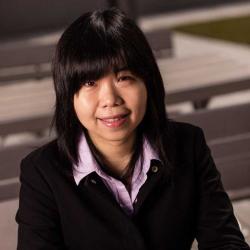
PhD (2019)
Katie completed her PhD in 2019 with CBE’s Research School of Accounting, where she examined the impact of regulatory changes on analyst behaviour and how this affects investor responses. She is currently working at the Auckland University of Technology’s (AUT) Business School as a lecturer in accounting. Katie’s research interests lie in financial accounting, in particular examining the role of information in capital markets, which includes financial analyst forecasts, firms’ voluntary disclosures and economic consequences of regulation changes. Her paper has been published in high quality journals like the Journal of Business Ethics and the Journal of Banking and Finance. She has also served as a reviewer for multiple top-tier journals such as the Accounting & Finance and Journal of Business Ethics.
Why did you choose to work in academia over industry?
Pursuing an academic research career has always been my passion. I love the nature of academia, which can be an adventure when it comes to conducting research and, in turn, offers opportunities to influence the next generation through imparting knowledge.
I also enjoy the freedom and flexibility to dictate my own schedule. As an academic, most of the time I can choose to manage my priorities and time to investigate my own areas of research interests. I am not a fan of having to get work done on a fixed schedule that is driven by a product or business goals, which can often be the case when working for private companies.
What qualities is your university looking for when hiring a new PhD graduate in your discipline?
The Accounting Department at the AUT Business School prefers to work with emerging researchers with good research aspirations, which are demonstrated by showing a sound pipeline of projects or papers, or some promising ‘revised and resubmitted’ papers in high-quality journals. Abundant teaching experience is also preferred; however, the ability to teach can be developed with experience. The individual’s personality matters as well. Since our working environment is largely collaborative and teamwork oriented, our department looks for people who are genuine, friendly, and easily to get along with to join the team.
How do you discover new research ideas and develop your research network?
To find new research ideas, I usually start from my area of expertise – analyst research, as well as by reading relevant literature, news articles, and even talking to the professionals in the relevant area. Events are also useful for this, as they can serve as an ideal setting to test the association between the variables of interest; for instance a regulatory reform like the Global Settlement.
Attending conferences and seminars provides good opportunities to explore new research connections. Initially, I usually consult my colleagues to see if we have common or complementary research interests and skill sets. Accordingly, we’ll complete a comprehensive research proposal with preliminary results before seeking comments and suggestions from more established researchers, or if possible, developing further collaboration.
What is your advice to our current PhD candidates, who may be early in their candidature or close to completion, on their career preparation?
Their focus should be on developing their theses proposal or conducting data collection and preliminary tests. However, my advise is to also try exploring research ideas in areas that are different from the ones in their theses and initiate additional research projects or collaboration with other colleagues if possible. Students in their early candidature might have the luxury of time to develop boarder research interests, so do not waste it.
For PhD students close to their completion, I suggest they try their best to accumulate experience in conference presentations. Having a journal publication or at least ‘revised and resubmit’ papers to prove your ability to conduct high-quality research is becoming necessary as an entry requirement for academia. Make sure you always consult your supervisors, professors, or other senior colleagues for help. Polish your application package and enhance your interview skills for the job market as early as possible because you will face competitors from all over the world who may be well trained in a more rigorous PhD program who have demonstrated their potential by publishing in top-tier, A-Star journals.
I understand it is a challenging time for universities in Australia and New Zealand due to the COVID-19 pandemic, which has limited job openings. Consider this period as a winter season, which can be an excellent time to increase your research capacity and build your CV. Spring will come eventually, and opportunities will come to those who are well prepared.
